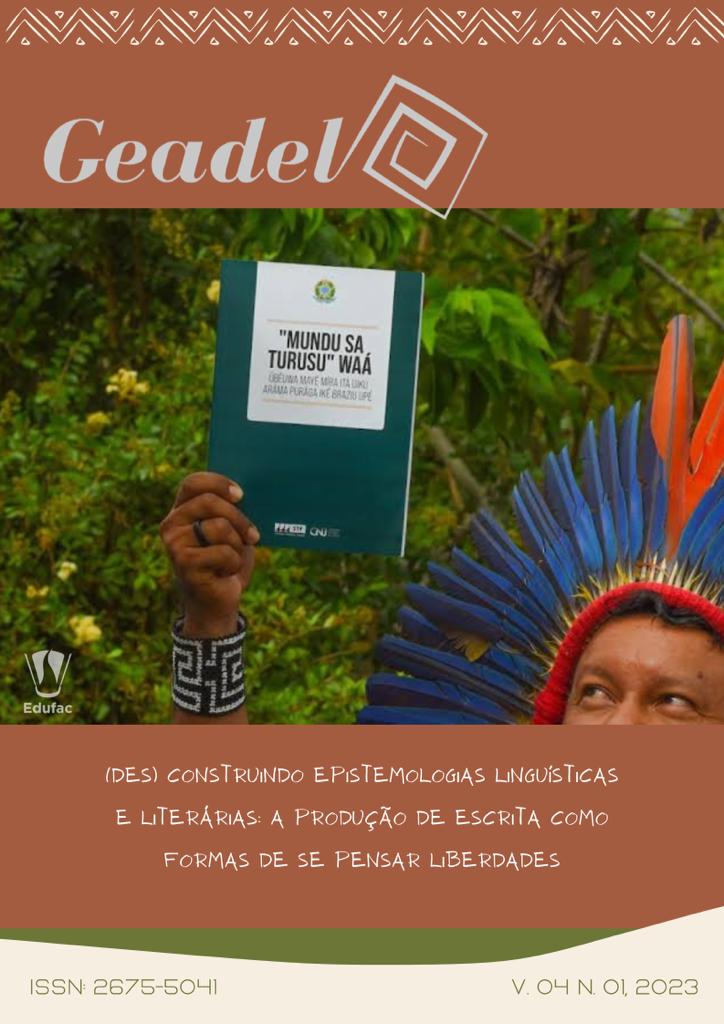Cultural-identity ties and unties in the corners of Aquiri
“the land of the brave” – in the lyrics of the song Rimadeira
DOI:
https://doi.org/10.29327/269116.4.1-9Palabras clave:
Keywords: Culture; Identity; History; AcreResumen
Abstract: This article aims to study one of the traits of the culture and identity of the Acre people, concerning the man of the forest, known as rubber tappers from the lyrics of the song Rimadeira by Álamo Kário. Through the speeches present in the lyrics, we can analyze some ideologies that can refract one of the facets of culture, identity, as well as some landscape elements that have become reference points of the Acre culture and that can serve as subsidies for the understanding of one of the historiographical traces of a people who fought against Bolivians for this part of the Amazon soil and who are still striving to have their place recognized in the history of settlement, construction and development of the state that fought to become Brazilian.
Citas
BAKHTIN, M. M. Estética da criação verbal. 3. ed. Tradução feita a partir do francês por Maria Ermantina Galvão. Revisão da tradução: Marina Appenzeller. 3. ed. São Paulo: Martins Fontes, 2000.
BAKHTIN, M. M. (VOLOSHINOV). Marxismo e filosofia da linguagem: problemas fundamentais do método sociológico na ciência da linguagem. Trad. Michel Lahud e Yara Frateschi Vieira. São Paulo: Hucitec, 2009.
BAUMAN, Zygmunt. O medo líquido. Tradução: Carlos Alberto Medeiros. Rio de Janeiro: Jorge Zahar, 2008.
BHABHA, H. K. O compromisso com a teoria. In: BHABHA, H. K. O local da cultura. Trad. Myriam Ávila, Eliana Lourenço de Lima Reis e Gláucia Renate Gonçalves. Belo Horizonte. Ed. UFMG, 2005.
CAUQUELIN, Anne. A invenção da paisagem. Tradução: Evandro Mendonça Martins Fontes. São Paulo: Martins Fontes, 2007.
COLLOT, Michel. Poética e filosofia da paisagem. Trad. Ida Alves et al. Rio de Janeiro: Oficina Raquel, 2013.
CUNHA, Euclides. A margem da história. 5. Ed. Porto, Lello & Irmão, 1941.
DEAN, Warren. A luta pela borracha no Brasil: um estudo de história ecológica. São Paulo: Nobel, 1989.
HALL, S. Notas sobre a desconstrução do ‘popular’. In: HALL, S. Da diáspora: identidades e mediações culturais. Trad. Adelaine La Guardia Resende e outros. Belo Horizonte: Editora da UFMG, 2009.
______. A identidade cultural na pós-modernidade. Trad. Tomaz Tadeu da Silva e Guacira Lopes Louro. Rio de Janeiro: DP&A, 2006.
HOLANDA, Sérgio Buarque de. Raízes do Brasil. (26ª edição) São Paulo: Companhia das Letras, 1995. p. 147.
MAIA, José Sávio da Costa. Um olhar sobre os “empates”: resistência da/na fronteira sul-ocidental amazônica. REVISTATEL – Tempo, Espaço e Linguagem. 2017.
POLLAK, Michael. Memória e identidade social. Estudos Históricos, Rio de Janeiro, v. 5, n. 10, p.1-15,1992.
RAJAGOPALAN, K. A construção de identidades: linguística e a política de representação. In: _____. Por uma linguística crítica: linguagem, identidade e a questão ética. São Paulo: Parábola Editorial, 2003.
RANZI Cleusa M. D. Raízes do Acre. Rio Branco: EDUFAC, 2008.
RIBEIRO, Napoleão. O Acre e seus heróis: contribuição para a história do Brasil. Brasília: Senado Federal, 2008.
SOUZA, Carlos Alberto Alves de. História do Acre: novos temas, nova abordagem. Rio Branco: Edição do autor, 2005.
TOCANTINS, Leandro. Formação histórica do Acre. 3 ed. Rio de Janeiro. Editora: Civilização Brasileira, 1979.
Descargas
Publicado
Cómo citar
Número
Sección
Licencia
Derechos de autor 2023 Academic Journal Geadel

Esta obra está bajo una licencia internacional Creative Commons Atribución-NoComercial 4.0.
Os autores concedem à revista todos os direitos autorais referentes aos trabalhos publicados. Os conceitos emitidos em artigos assinados são de absoluta e exclusiva responsabilidade de seus autores.





